
 |
|||
PaperLSC Year Two Cross-Site Report
Level of Preparedness Reported by Cohort 2 Mathematics Teachers in Various Mathematics Content Areas
Responses on the principal questionnaire indicate that principals recognize and are concerned about the issue of teacher preparation in science and mathematics content. About three-quarters of principals at LSC-targeted schools indicate that teacher preparation to teach science subject matter is a problem. (See Figure 30.) Nearly 30 percent of these principals characterize it as a major problem at their school. Teacher preparation in mathematics content is not seen as problematic by as many principals, but it is a serious issue at a number of schools (a "major problem" according to 19 percent of Cohort 2 mathematics principals). These data indicate that most principals at elementary schools targeted by LSC projects are aware of their faculty's lack of content background in science and mathematics and the impact this has on classroom instruction. Principals' recognition of this issue may be a first step toward administrative support for LSC staff development initiatives. 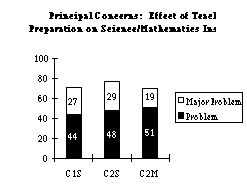 Figure 30 Based on early indications from Cohort 1 teachers, it seems likely that LSC professional development will have a significant impact on teacher preparation in science and mathematics content and pedagogy, and in their self-confidence in these areas. The following evaluator comments are typical: "Science has been an area of interest for this teacher. She always felt that students must be actively involved in it. The difference is that this year she knows more about how to present science to her first grade students and to stress concept development. She is more confident about her teaching style and her content knowledge." "When interviewed in spring 1996, teachers report they are learning science concepts and processes themselves through project PD opportunities and through teaching the [LSC project's] curriculum modules to students in their classes. They mention how much their confidence and interest in teaching science is changing, and say the [LSC project's] training has played a critical role in that change." Preparation in Pedagogy, Instructional Strategies, and Assessment Techniques Teachers were asked several questions regarding their preparedness to implement a number of pedagogical and instructional strategies central to standards-based science and mathematics instruction. The pedagogical content composite combines teacher ratings of their preparation to:
The instructional strategies composite provides a snapshot of teachers' preparedness to implement instructional strategies including:
Ratings on these composites indicate that elementary teachers tend to be more comfortable with standards-based pedagogy and instructional strategies in mathematics than in science. (See Figures 31 and 32.). 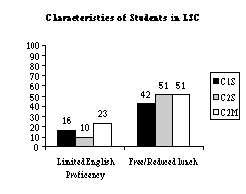 Figure 31 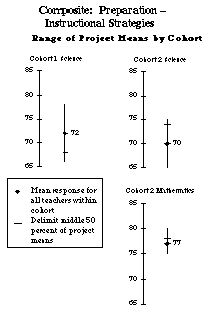 Figure 32 Many teachers characterize themselves as fairly well (but not very well) prepared to implement standards-based pedagogical techniques. For example, while roughly 75 percent of teachers consider themselves at least fairly well prepared to take students' prior understanding into account when planning curriculum and instruction in science, only 30 percent consider themselves very well prepared to do so. Very similar responses are seen for other pedagogical strategies such as developing students' conceptual understanding, making connections between disciplines, and providing concrete experiences before abstract concepts. (See Table 11.) Teacher Perceptions of Their Preparation to Implement Standards-Based Instruction
Similarly, many teachers consider themselves fairly well (again, not very well) prepared to use standards-based instructional strategies. For example, 71 percent of Cohort 2 mathematics teachers say they are at least fairly well prepared to engage students in inquiry-oriented activities; only 21 percent said they are very well prepared to do so. Somewhat higher levels of preparedness are reported for strategies like using cooperative learning groups and hands-on activities in the classroom. The lowest levels of preparedness are reported for using computers in science/mathematics instruction; only 36 percent of teachers in C1S, 40 percent in C2S, and 54 percent in C2M say they are at least fairly well prepared in this area. Comparing the importance teachers place on these pedagogical strategies to the level of preparedness they feel reveals an interesting contrast. (See Figure 33.) Across the board, teachers report higher levels of import than personal preparedness to implement standards-based strategies. For example, over 80 percent of LSC targeted teachers feel that providing students with concrete experience before presenting abstract concepts is very important in science/mathematics instruction; however, fewer than 20 percent of science teachers, and only 41 percent of mathematics teachers feel highly prepared to practice this in the classroom. Over two-thirds of the LSC teachers feel it is very important to make connections between science/ mathematics and other disciplines, but only about one-quarter feel they are well prepared to do it. These data indicate that teachers have positive feelings about the importance of various components of standards-based instruction, but they are somewhat less assured of their preparedness to implement them in their own classrooms. Comparison of Teachers Responding "Very Important" and "Very Well Prepared" to Use Various Strategies 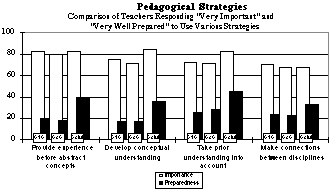 Figure 33 Questionnaire results show a very similar disparity between teacher ratings of the importance of other standards-based instructional strategies (such as hands-on activities, cooperative learning, and using computers) and their perceived level of preparedness to use these strategies with students. (See Figure 34.) For example, engaging students in inquiry-oriented activities is considered very important by 71 percent of science teachers and 62 percent of mathematics teachers; yet only about 20 percent of the science teachers and a quarter of the mathematics teachers feel well prepared to use inquiry methods. As one evaluator noted: "They are comfortable with their ability to take into account students' understanding when planning instruction and having students participate in hands-on activities. It is good to see that they recognize that hands-on instruction is not necessarily minds-on instruction as they are less comfortable in their ability to engage students in inquiry-oriented activities." Comparison of Teachers Responding "Very Important" and "Very Well Prepared" to Use Various Strategies 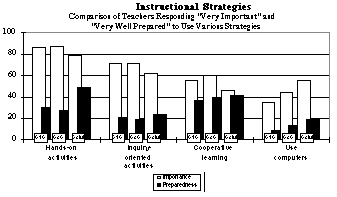 Figure 34 Even though fewer than half of LSC teachers view computer use as highly important for elementary science/mathematics instruction, this is still a great contrast to the fewer than 15 percent who feel highly prepared to use computers in the classroom. Again, such contrasts between the perceived importance and the preparedness teachers report might be indicators of areas where LSC teachers would be especially interested or motivated to receive assistance. As mentioned earlier, LSC teachers do not all agree on the importance of authentic assessment techniques advocated by the national standards. Still, as with pedagogy and instructional strategies, there is frequently a marked contrast between the importance teachers place on a particular assessment strategy and the level of preparedness they report for using it. (See Figure 35.) For example, about half of the LSC teachers think that informal questioning is an important way of gauging student understanding; yet, only about 30 percent of the teachers feel very well prepared to use this assessment strategy. Similarly, performance-based assessment is viewed as very important by more teachers than feel prepared to assess children in this manner. Interestingly, the only strategy surveyed that does not demonstrate this trend (higher levels of importance than teacher preparedness) is portfolio assessment; more mathematics teachers consider themselves very well prepared to use portfolios to assess student understanding (30 percent) than report it as a very important assessment technique (22 percent). Among science teachers, the general trend is seen again, as about one-quarter of the teachers consider portfolios very important and only about 15 percent feel highly prepared to use them for assessing student progress. Comparison of Teachers Responding "Very Important" and "Very Well Prepared" to Use Various Strategies 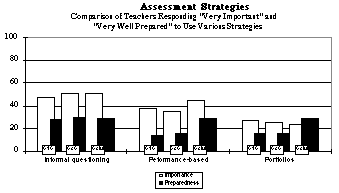 Figure 35 Preparation to Address Issues of Equity in the Classroom Teachers were asked questions regarding their preparedness to deal with issues of equity and diversity in the classroom. This attitudinal composite includes teacher ratings of their preparedness to:
Ratings on this composite show that teachers generally feel fairly well prepared to deal with equity issues. (See Figure 36.) For example, nearly all teachers report feeling at least somewhat prepared to recognize and respond to student diversity and to encourage student interest in science/mathematics and nearly half of the teachers characterize themselves as very well prepared in these areas. Somewhat fewer teachers are as confident of their ability to use strategies that specifically encourage the participation of females and minorities in science/mathematics. Only about 35 percent of science teachers and 42 percent of mathematics teachers report that they are highly prepared to be proactive in this regard. 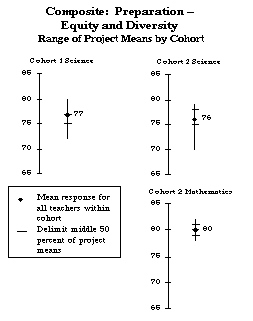 Figure 36 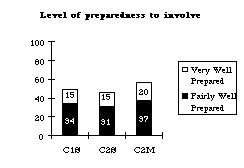 Figure 37 Much lower percentages of teachers responded that they are prepared to involve parents in the science/ mathematics education of their children. Approximately 15 percent of science teachers and 20 percent of mathematics teachers report they are very well prepared in this area. (See Figure 37.) At the same time, teachers are reporting that inquiry-based instruction is helping get parents involved. Noted two LSC teachers:
A Cohort 1 evaluator reported the following comment from a parent of a student whose teacher has participated in LSC professional development:
Summary Elementary teachers targeted by LSC projects have remarkably positive attitudes toward science and mathematics reform. Teachers place high levels of importance on many standards-aligned pedagogical and instructional strategies such as providing concrete experience before abstractions, developing students' conceptual understanding, making connections between disciplines, and using inquiry-oriented activities. Attitudes about alternative assessment strategies are not so closely aligned with standards-based instruction; many LSC teachers do not place a high level of importance on techniques such as performance-based and portfolio assessments. The generally positive teacher attitudes contrast markedly with the level of preparation teachers report for the same strategies. Teachers targeted for LSC professional development generally do not consider themselves well-prepared to implement many elements of standards-based instruction. Disparity between the perceived importance and the preparedness teachers report might be indicators of areas where LSC teachers would be especially interested or motivated to receive training. In addition, many LSC teachers report feeling a lack in their preparation to teach a number of the science and mathematics content areas they are expected to teach, suggesting a need for increased attention to content in professional development. | |||||||||||||||||||||||||||||||||||||||||||||||||||||||||||||||||||||||||||||||||||||||||||||||||||||||||||||||||||||||||||||||||||||||||||||||||||||||||||||||